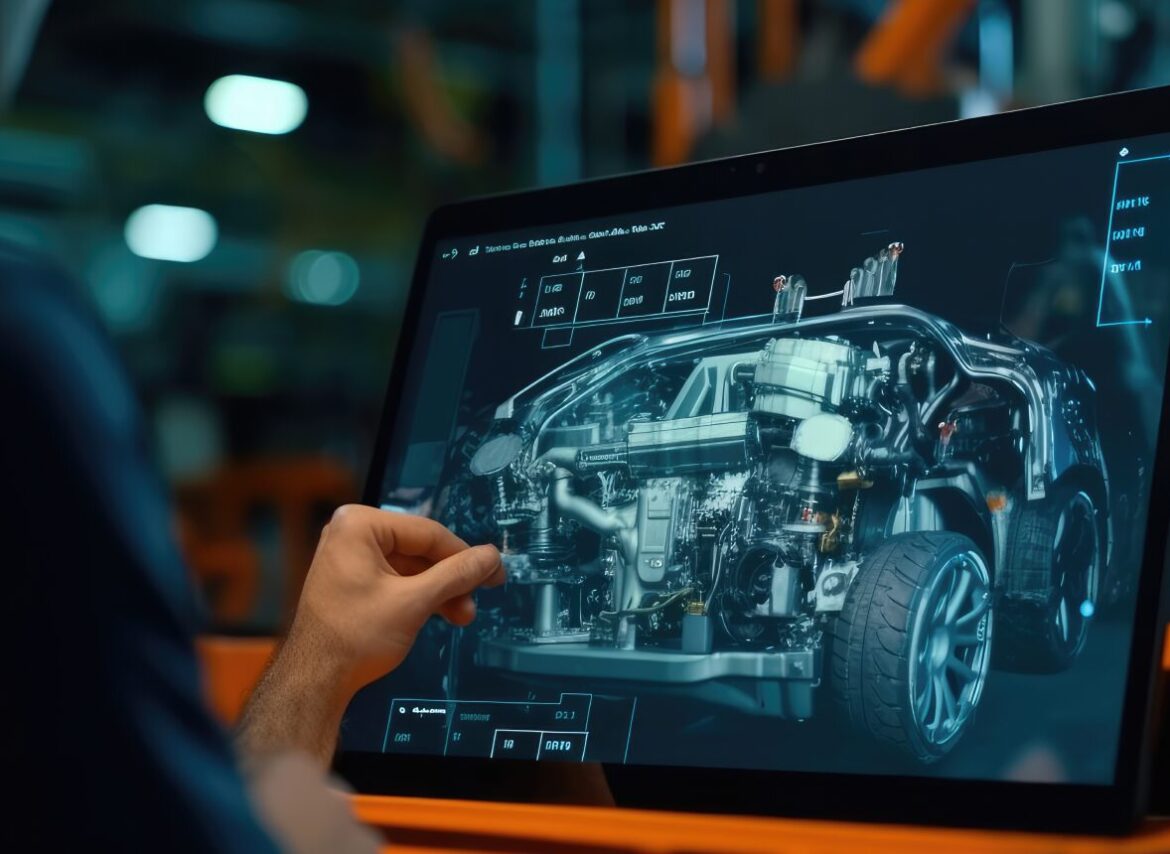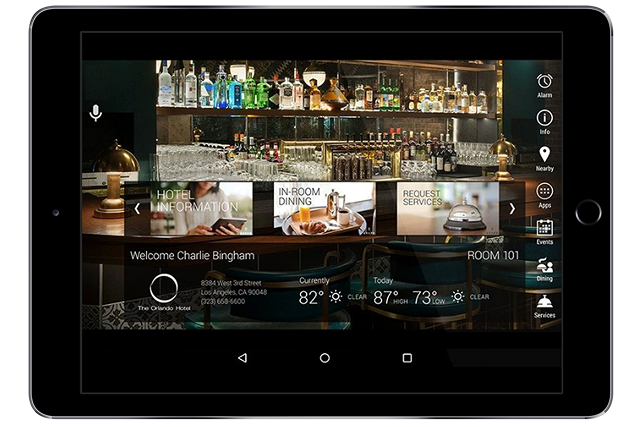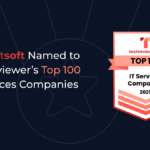The automotive industry is facing intense competition from all sides, and it’s sparking a new challenge – an overestimated demand for cars. As budgets and workforce sizes balloon, car manufacturers are forced to rethink their approach. To stay ahead, they need to embrace internal technologies that allow them to move quickly, make smarter decisions, and stay focused in the long run.
To deal with issues and play in the market, some may say that car makers need to think differently and adopt new tech strategies. But the question is: How? And that’s where ERP software for the automotive industry comes in.
With its ability to synchronize data, manage overstock, cut expenses through comprehensive reporting, and eliminate inefficiencies, ERP software is a brilliant tool.
This solution helps automotive companies stay compliant with “green” regulations, serve customers more effectively, and boost operational productivity – a real challenge for many in today’s auto landscape.
Understanding Automotive ERP Solutions
But what do these 3-letter acronyms actually mean?
ERP, or Enterprise Resource Planning, is a comprehensive software platform that helps businesses manage and connect the many facets of their operations. Think of it like the central nervous system for a company’s data and processes. It brings together finance, warehouse, supply chain management, operations, reporting functions, manufacturing capabilities, and human resource tasks under one roof.
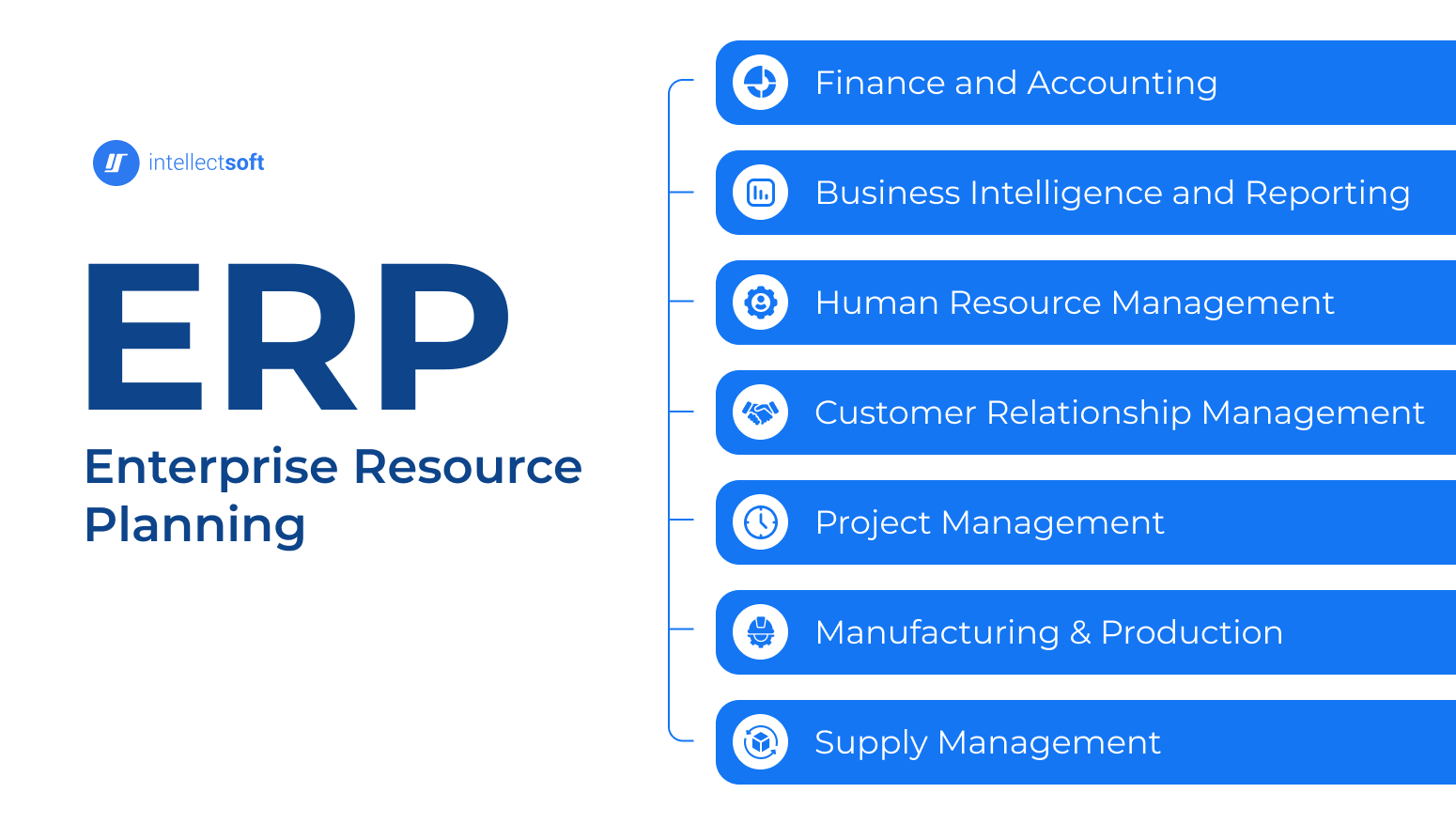
Note: ERP is different from CRM since CRM focuses on client relationships, while ERP software brings data from all the parts/corners of your organization into one place.
While many stakeholders may say that having an ERP is an IT project, we hope you think it’s a business project. Let’s see what Chris Doig says about ERP:
“Implementing ERP is not an IT project; it’s a business project with IT components.”
— Chris Doig
We can’t help but agree more with this statement. ERP helps you prevent overspending and save money on things that don’t work before they show up on your income statement and other reports at the end of the year. And it’s not only an IT project anymore since it merges with your business strategy.
Another statement that highlights the side of ERP and the importance of people using this system:
“ERP success depends on people, not just technology. Engage your team for the best results.”
— Eric Kimberling
Very well said. We’ve heard from many clients that they created a new ERP system but didn’t provide the right training on how to use it properly. So, people can’t fully tap into the potential of the system.
Definition of ERP in the automotive industry
Manufacturers, in general, are the top industry for purchasing ERP (47%)
Having a well-working ERP is a pathbreaker. It can manage processes, show the gaps, and point out the direction in which things can be improved and where the costs can be cut.
- Overall, an ERP in the automotive industry lets you control your shop (showroom) floor and production, connect your business with clients, and activate the potential of your people.
- It automates workflows and brings visibility to the production process through charts.
- It tracks supply chain operations, optimizes production schedules for resourcefulness, helps reduce errors, and cuts costs through insights.
- It enables order processing and delivery, tracks customer interactions and preferences, and guarantees vehicles meet compliance.
The capabilities of a custom ERP are endless. With custom ERP, you can add any feature you envision for your business.
Key Functions of Automotive ERP Systems:
Let’s break down the features you may want to include in your ERP (not limited to):
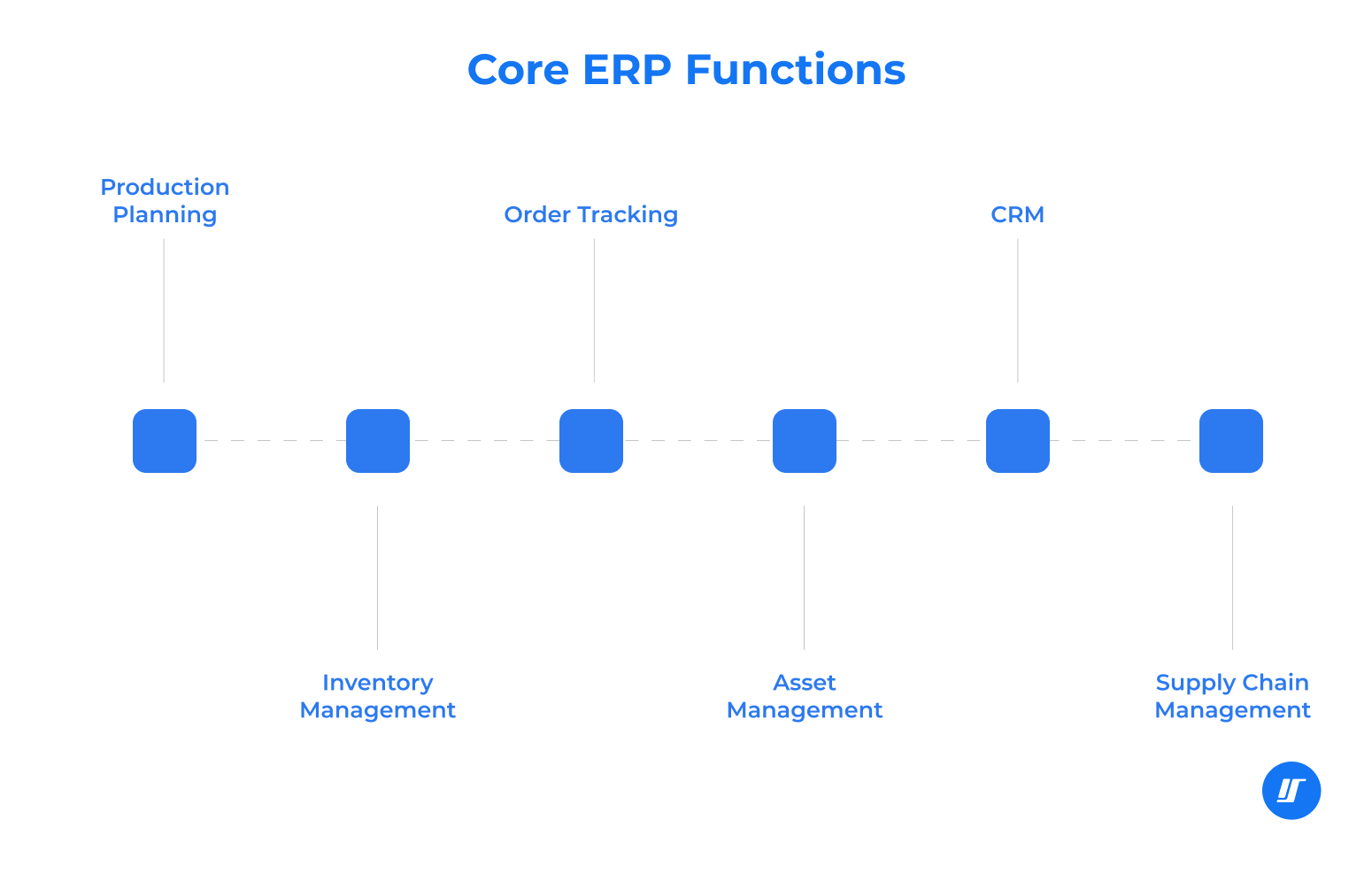
Inventory Management
In a highly expensive environment, making every resource count in your automotive business is a must. Inventory and resource management software allows you to track everything, making sure nothing goes to waste. With real-time insights, you can reduce overstock, avoid shortages, and optimize operations, enabling sustainable control and clarity on areas that need more focus.
Supply Chain Optimization
The most critical yet often invisible software feature in a car manufacturing company is the supply chain. In today’s world, manufacturing and assembling a car is like an intricate dance, with every piece and part needing to arrive at the right place at the right time to fit into the right vehicle. These supply chains are incredibly complex, spanning multiple levels and often sourcing components worldwide.
Now, imagine an in-built feature managing this intricate process across multiple levels, plants, and organizations. If this feature were to fail, it could – and sometimes have – bring the entire production process to a standstill. The cost of halting an assembly line that produces hundreds of cars a day is staggering.
Production Planning and Scheduling
ERP production planning can mean many things to many people. ERP production planning is the coordination of people, machine capacity, and raw materials, so you can make what you make when you need to. The key phrase of “…when you need to” is based on a customer demand or an internal demand (sub-assembly, forecast, etc.). The need for better production planning is usually a major driver for the search and purchase of an ERP system.
Order tracking
Integrating real-time visibility of your order into your manufacturing process allows you to monitor the status of each order as it moves through production. This means you can quickly identify and address any issues, confirming that cars are delivered to clients or dealers without unnecessary delays.
Asset Management
This means keeping track of all the equipment and materials used in manufacturing. By using connected systems, businesses can know where their assets are. Detect issues in processes and guarantee better visibility when working with contractors or customers. This approach helps prevent problems, reduces downtime, and validates that everything is in good working condition.
CRM
This integration has become important with the evolving nature of customer interactions. Traditionally, car manufacturers did not engage directly with customers; this responsibility fell to dealers. Now, many manufacturers are bypassing this layer and dealing directly with clients (which is beneficial for manufacturers in the end). It allows them to keep clients promptly updated on their orders.
Compliance and Quality Management
A custom ERP system can be designed to align with the specific regulations governing your industry. Your tech partner can integrate compliance requirements directly into your workflows; the system sees to it that your operations comply with necessary standards, reducing the risk of non-compliance that will cost you dozens, hundreds (or millions!).
It also monitors each stage of production to be sure that quality standards are met, facilitating prompt detection and correction of defects.
Financial and Resource Tracking
Every resource should be counted. Automotive ERP systems precisely track finances and resources, giving businesses a clear picture of their expenditures and allocations.
Differences between off-the-shelf and custom ERP solutions
It’s important to start with your objectives. A pre-built ERP solution can be a good fit for many companies, especially smaller ones that need a quick solution and don’t plan to scale their system. In contrast, custom software requires a longer development time and higher upfront costs but serves as a long-term investment. It can evolve with the company’s needs, be easily modified (like a living organism), and continually improve with new features as required.
When it comes to off-the-shelf systems, it’s a love-hate relationship for many. While some businesses rely on well-known software providers expecting good results, feedback varies. Some users report decent performance, others find it works inconsistently, and many complain about inadequate training for team members. Additionally, businesses often discover that off-the-shelf solutions include unnecessary features while missing critical ones.
It’s said that the 3% of features you might need that aren’t included in off-the-shelf ERPs can end up being very important for you.
Customization in off-the-shelf solutions is usually possible but comes at a steep cost – sometimes in the $ millions for corporations. Custom ERPs may seem expensive, but just like buying the wrong machine tool gives very poor results, investing improperly in an ERP does the same.
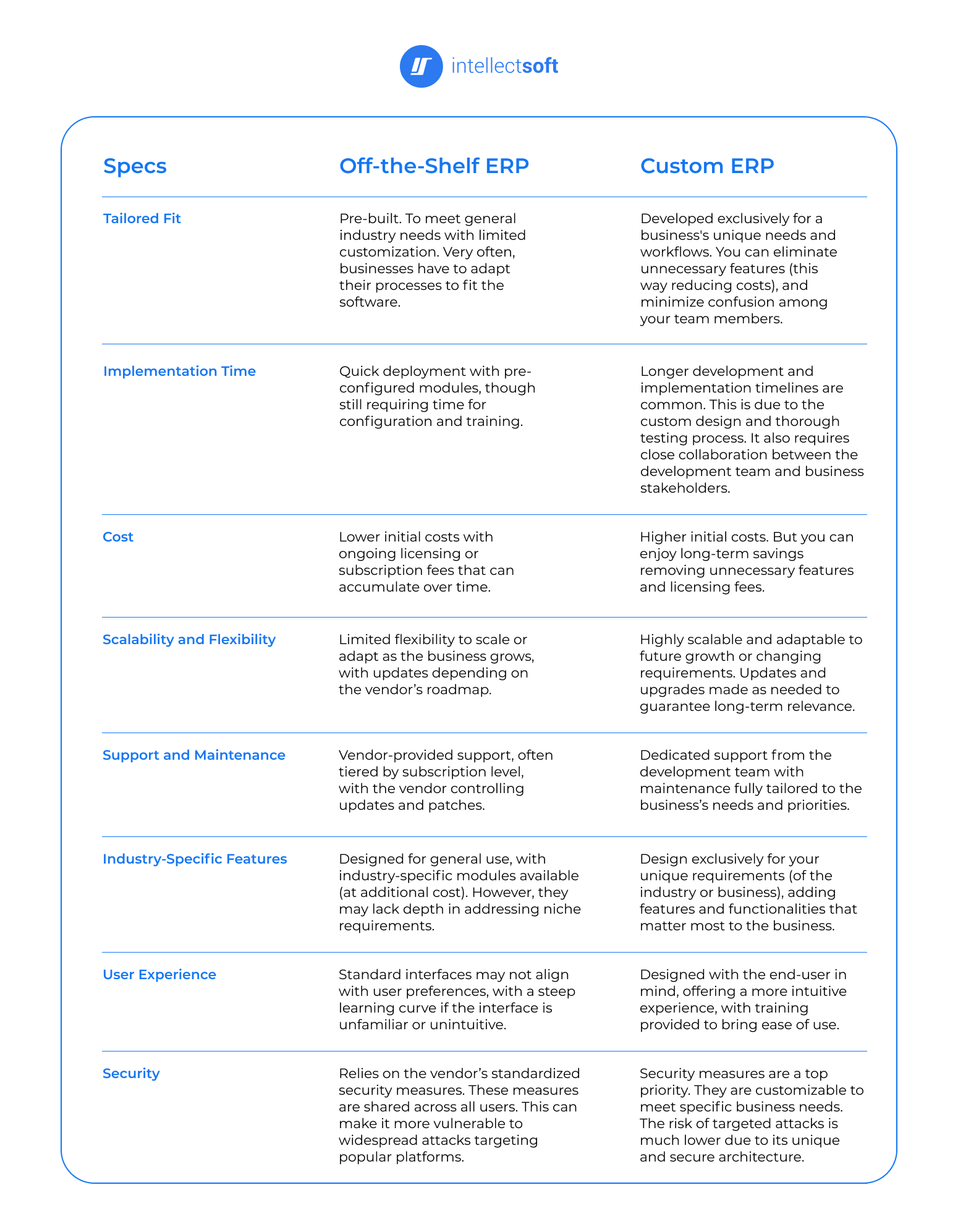
Challenges Faced by Automotive Manufacturers
Businesses face numerous challenges, both external and internal. External factors include issues such as inflation, which are difficult to predict and control. Internally, companies grapple with supply chain disruptions, regulatory compliance, and the shift toward direct manufacturer-client relationships. As a remedy, implementing the right software solutions can help optimize supply chain management, guaratee compliance with regulations, and improve customer communication (fostering brand loyalty).
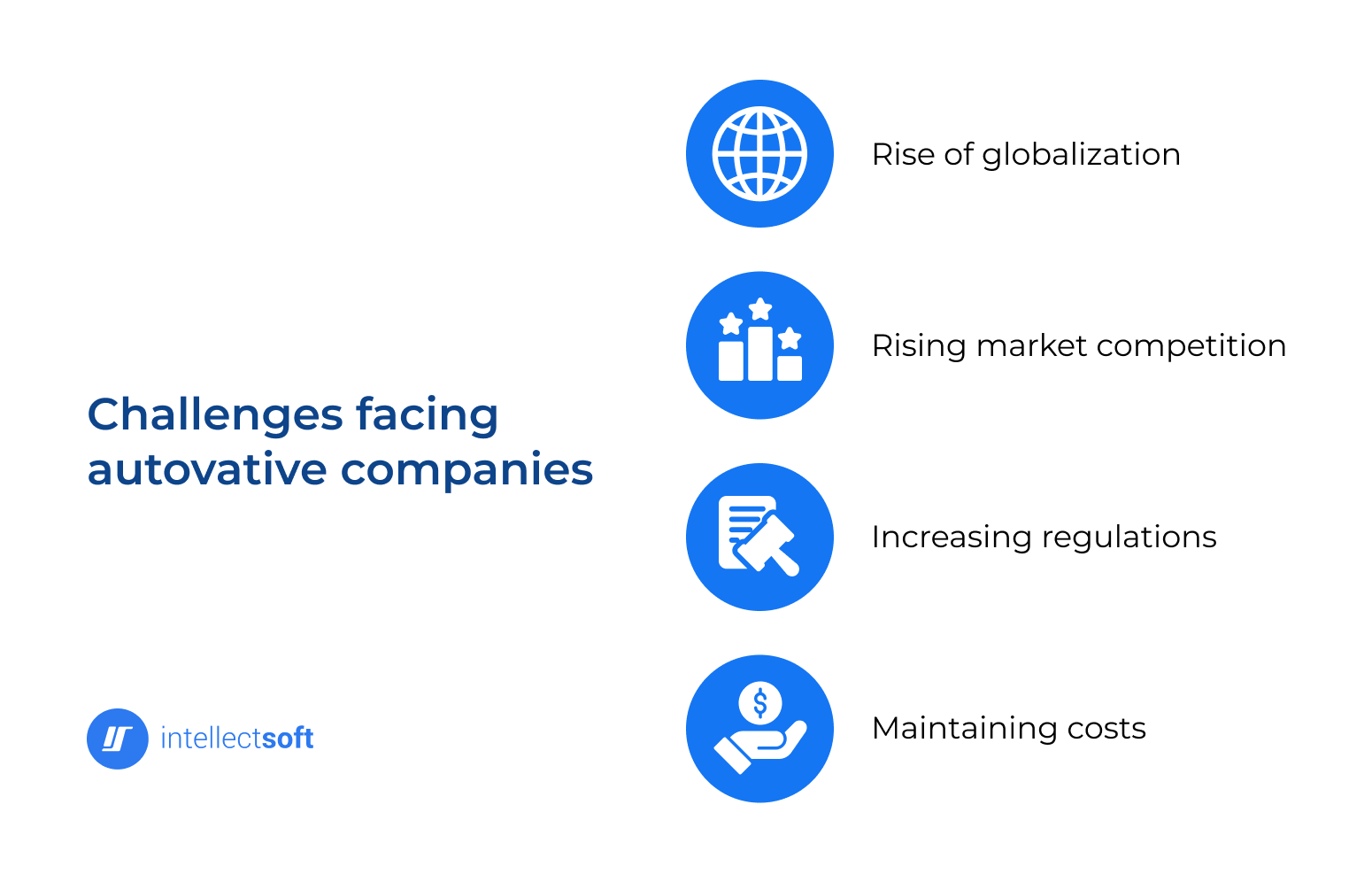
The aim for many car manufacturers is now to maintain the market share they’ve built up.
Let’s take a close look at all the challenges:
Complex Supply Chain Management and Coordination Issues
Managing supply chains can be tough. Car manufacturers often work with numerous suppliers and distributors, making it hard to keep everything under control and stick to the plan. Unexpected events like natural disasters or political issues can cause delays or shortages. These problems can lead to late deliveries, insufficient raw materials, and higher costs, frustrating customers to the point of canceling their orders and hurting profits.
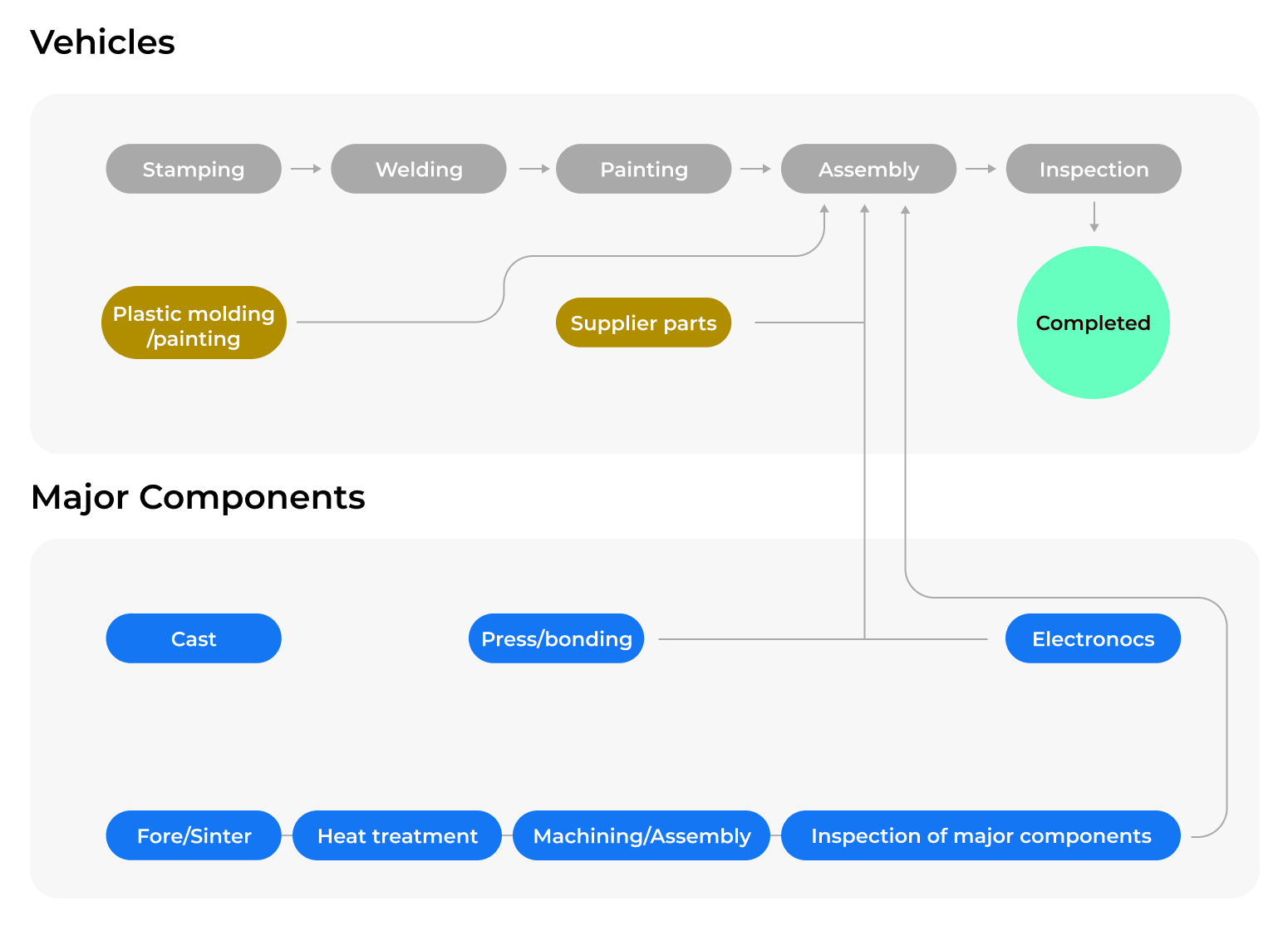
Regulatory Compliance with International and Local Standards
Automotive manufacturers must follow strict standards like IATF 16949 and ISO/TS 16949, which can make operations more complex. Using an Enterprise Resource Planning (ERP) system designed for the automotive industry can help manage them. ERP systems integrate all business functions, such as production, inventory, and quality control, into a single platform.
Rising Production Costs and Inefficiencies
There are two major issues (internal and external) affecting the automotive industry:
- Inflation and Increased Material Costs: Rising inflation and higher material costs are squeezing profitability. For example, the average price of making a new car has increased significantly, making it more expensive for consumers and challenging for manufacturers to maintain profit margins.
- Overestimated Demand and Production Challenges: An overestimation of demand for cars, coupled with expensive labor costs and production failures, has led to inefficiencies. Many manufacturers have struggled to align production with actual market demand, resulting in overcapacity and increased operational costs.
Data Silos and Lack of Real-Time Visibility Across Departments
Disconnected systems and data silos hinder efficient decision-making and coordination. The key aim of having an ERP system in place is to break down silos between departments. Get unified data. By allowing free-flowing communication within an organization and with its business partners, ERP opens access to up-to-date information when they need it.
Increasing Customer Expectations for Faster Delivery and Customization
The automotive industry is highly competitive. A powerful and reliable car is no longer sufficient; customers now expect fast delivery, custom solutions, and a high level of personalization.
Failure to match competitors’ use of data intelligence for speed and personalization can lead to losing market share. One size no longer fits all in today’s market.
How Custom ERP Solutions Address These Challenges
“The companies of the future must see the big picture rather than focusing solely on selling or performing services.”
It was said by the brand guru Theodore Levitt. It can’t be that relevant nowadays when brands are chasing sales and forgetting about the brand’s core vision, clients and their desires, shareholders, and team members.
Having software in place that can help strengthen your team by giving them a single source of truth, a clear picture of what is going on (not those spreadsheets that no longer work and the million systems that are hard to work with and fail to pull the data you need when you need it).
Systems must communicate with one another, and maintaining data integrity is key.
It allows you to build personal connections with your customers, making them want to come back and buy cars only from you while keeping shareholders updated on your progress.
Enhanced Supply Chain Visibility
With a custom ERP system, you can gain complete visibility across the supply chain, from order details to dealer communications and final delivery to customers.
Optimized Production Planning
The main goal of an ERP system is to eliminate silos between departments. By enabling seamless communication across an organization and its business partners. ERP double-checks that everyone has access to the up-to-date information they need when they need it.
Quality Assurance & Compliance
ERP systems play a key role in helping organizations meet compliance requirements set by regulatory bodies. Simplified access to all relevant information within a unified system validates compliance and quality assurance tasks.
Cost Efficiency and Resource Allocation
Custom ERP solutions improve operations. Thus, they enable organizations to optimize resources, allocate them strategically, and reduce unnecessary expenses.
Integration with Existing Systems
Custom ERP systems can easily work with the tools and software you already use, including the CRM system you rely on. They can also connect with analytics platforms like Qlik, Power BI, or Tableau to handle advanced data analysis while the ERP organizes your business data.
Scalability and Customization
A custom ERP system is scalable, flexible, and easy to use (as you will be the champion of the ERP creation and include only the features your business needs) and modify whenever you need it.
Key Features of a Custom Automotive ERP Solution
If you are here reading this, it means you are considering developing a custom ERP. Here are key features we recommend including in your system:
- Modular architecture for flexibility
Modular architecture makes custom ERP systems highly flexible. With this approach, you can pick and choose the features your business needs, avoiding unnecessary tools that don’t add value. For example, a growing company might start with basic inventory and accounting features and later expand to include advanced analytics or customer relationship management. This modular design ensures you only invest in what’s essential while keeping the door open for future upgrades.
- Cloud-based vs. on-premise ERP options
You can choose between cloud-based or on-premises ERP systems. Cloud ERP allows you to access your data from anywhere, which is great for remote teams. In fact, 58% of businesses prefer cloud ERP because it’s easy to access and use. On the other hand, on-premises ERP gives you full control over your data but can come with higher costs and maintenance. Choosing the right option depends on your business needs and how you want to manage your data.
- Advanced analytics and reporting dashboards
Custom ERP systems come with advanced analytics and real-time dashboards to help you track your business’s performance. These tools give you a clear view of operations so you can make better decisions. About 67% of businesses that use ERP analytics report that it helps them understand their operations better. Whether it’s inventory, sales, or production, these dashboards provide the insights you need to improve and grow your business.
- Mobile accessibility and IoT integration
With custom ERP, you can access your system from your mobile device and monitor equipment remotely. IoT integration allows you to track assets and operations in real-time, which is helpful for businesses with multiple locations or field operations. 72% of businesses that use IoT in their ERP systems report better efficiency and lower maintenance costs. Mobile access confirms your team can stay connected and make decisions no matter where they are.
- Security features to protect sensitive data
Security is a top priority with custom ERP systems. These systems include encryption, access controls, and regular security checks to keep your data safe. About 64% of businesses choose custom ERP because of its strong security features. With custom ERP, you can protect sensitive business data from cyber threats and stay compliant with industry regulations.
- AI and machine learning for predictive maintenance
Custom ERP systems can use AI and machine learning to predict when equipment might fail. This helps you avoid costly breakdowns and repairs. Businesses using predictive maintenance have seen up to a 25% reduction in maintenance costs and a 70% improvement in equipment uptime.
How to Implement a Custom Automotive ERP System
- Assess Your Business Needs
Take the time to understand your business requirements. What challenges are you facing? What goals do you want to achieve with an ERP system? This is the first step to be sure the solution is the right fit for you. - Choose the Right Vendor
Partner with a vendor that understands your challenge and can offer a bespoke ERP solution. Look for a team that does not only want to win working with your business but is reliable, experienced, can listen and bring to the table solutions that can solve the challenges, and is committed to a long-term relationship. - Customization & Development
Customize the ERP system to match your processes. Not all businesses need CRM in their ERP; some may already have CRM. Whether it’s inventory management, procurement, or customer relations, make sure the system meets your specific business needs. Be it bettering the process, improving customer satisfaction or cutting costs, etc. - Testing and Deployment
Before going live, it’s critical to test the system thoroughly. Make sure everything runs smoothly and address any issues that come up. Once it’s all set, deploy the system with confidence. - Training and Adoption
Get your team on board, and provide good training. The more they understand how the system works, the better they’ll be at using it effectively. The goal is smooth adoption so everyone feels comfortable and empowered. - Continuous Monitoring and Improvement
ERP implementation doesn’t stop at launch. Keep an eye on system performance, gather feedback, and make improvements as needed.
Future Trends in Automotive ERP
AI-driven Automation and Predictive Analytics
Consumers and shareholders want solutions that give better insights and faster responses. AI-driven automation and predictive analytics help make this possible. Many ERPs now use AI to handle repetitive tasks, predict trends, and provide useful insights. These results are added back into the ERP system, helping businesses make smarter decisions and work more efficiently.
Blockchain for Enhanced Supply Chain Transparency
Blockchain technology is improving how supply chains are managed in the automotive industry. It helps keep track of every step in the production process with transparent, secure records. This builds trust and makes it easier for businesses to see exactly where materials come from and how they move through the supply chain.
Green Manufacturing and Sustainability Tracking within ERP
With new regulations pushing for lower emissions and cleaner practices, carmakers are focusing on sustainability more than ever. Custom ERP systems are essential in this area. They gather and analyze data on things like energy use, waste, and carbon emissions. This helps companies follow green regulations and make smarter choices for the environment. As sustainability becomes more important to consumers (and shareholders), having a custom ERP system that tracks this data gives companies a competitive edge.
The rise of Industry 4.0 and smart factories
Industry 4.0 in car manufacturing uses technologies like sensors, AI, and robots to make factories smarter. Machines and devices in the factory are connected to each other, which allows them to share data instantly. For example, sensors can monitor production lines, track equipment performance, and identify potential issues before they cause problems. AI analyzes this data to make decisions, and robots can automate tasks, reducing human error and speeding up production.
Choosing the Right ERP Partner
Picking the right ERP partner is like finding the perfect match. Having the right support to back you up is key to ensuring your business gets the best system to fit your needs. A good ERP partner will understand your business, provide a system that grows with you, and help you through the process from start to finish. It’s important that they have experience and know how to deliver the right solution for your business.
Criteria for Selecting an ERP Development Partner
- Experience:Look for a partner who knows how to handle complex systems, is good at communication, and can find the key to your challenge.
- Customization: You want a partner who can adjust the ERP system to suit your specific business needs, not just a one-size-fits-all solution.
- Technology: Make sure the partner uses modern technology that can easily connect with the tools you already use.
- Support Services: After the ERP system is up and running, you’ll need ongoing support. Choose a partner who keeps your system updated.
- Reputation: Check their reviews and feedback from other customers to see if they’re trustworthy and reliable.
Questions to Ask Potential Vendors
- Can your ERP system be customized to meet our specific needs?
You’ll want a system that can be tailored to fit your business. - How long will it take to implement the system?
It’s important to know how much time you’ll need for the system to go live. - What kind of support will we get after the system is implemented?
Find out if the vendor offers training, support, and regular updates once the system is live. - How do you handle data security?
Ask how the vendor keeps your business data safe and guarantees the system complies with regulations.
Importance of Post-Implementation Support and Updates
After your ERP system is live, support is a crucial part of making sure everything works well. A good ERP partner will offer help if something goes wrong and will provide updates to keep the system secure and running without a hassle.
Conclusion
Intellectsoft has over 17 years of experience in creating custom software solutions, including for the automotive industry. We’ve helped many businesses build custom ERP systems that work their magic – improve workflows, increase customer satisfaction, and grow revenue $. If you’re ready to take your business to the next level and delight your team members with a system that works perfectly, we’re here to help. Reach out today to see how we can support your goals.
FAQ
How long does it take to implement an ERP solution?
The time it takes to implement an ERP solution depends on the complexity of your business and the size of the system. On average, ERP implementation can take 6 months and more.
Can ERP systems be integrated with existing software?
Yes, ERP systems can typically be integrated with other existing software used by your company, such as CRM systems, accounting software, or inventory management tools. This integration syncs all your systems together. So, you can enjoy a seamless flow of data and gather the fruits of improved overall business efficiency.
What are the biggest challenges during ERP implementation?
The biggest challenges during ERP implementation are:
- Data migration: Moving data from old systems to the new ERP can be tricky and time-consuming.
- User adoption: Getting team members to fully adopt the new system can be challenging, especially if they are used to old processes.
- Customization: Customizing the ERP to fit your specific needs may take longer and require additional resources.
- Integration with existing systems: Ensuring the new ERP works well with other software can be a complex task.
- Training: Properly training staff to use the new system is a must for a light transition.
How does a custom ERP improve ROI?
A custom ERP improves overall processes. It reduces inefficiencies and automates tasks that were previously done manually. This means having a bespoke solution can lead to cost reductions. Additionally, a well-integrated custom ERP system can increase customer satisfaction, which can lead to a high retention rate and increased revenue over time.
Source link







